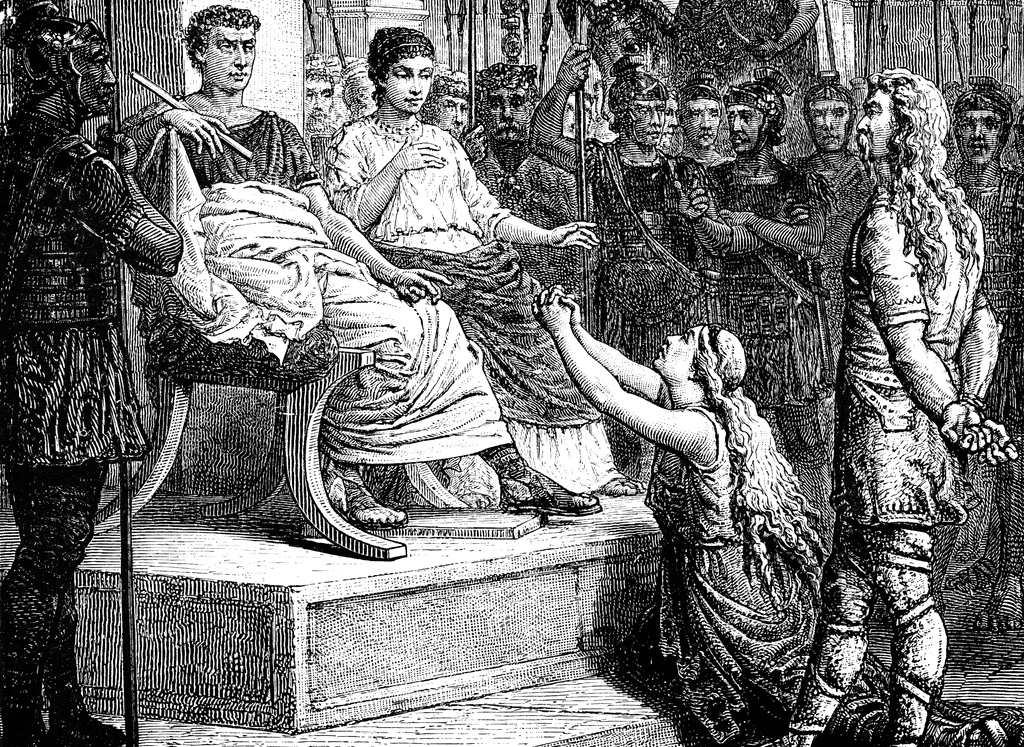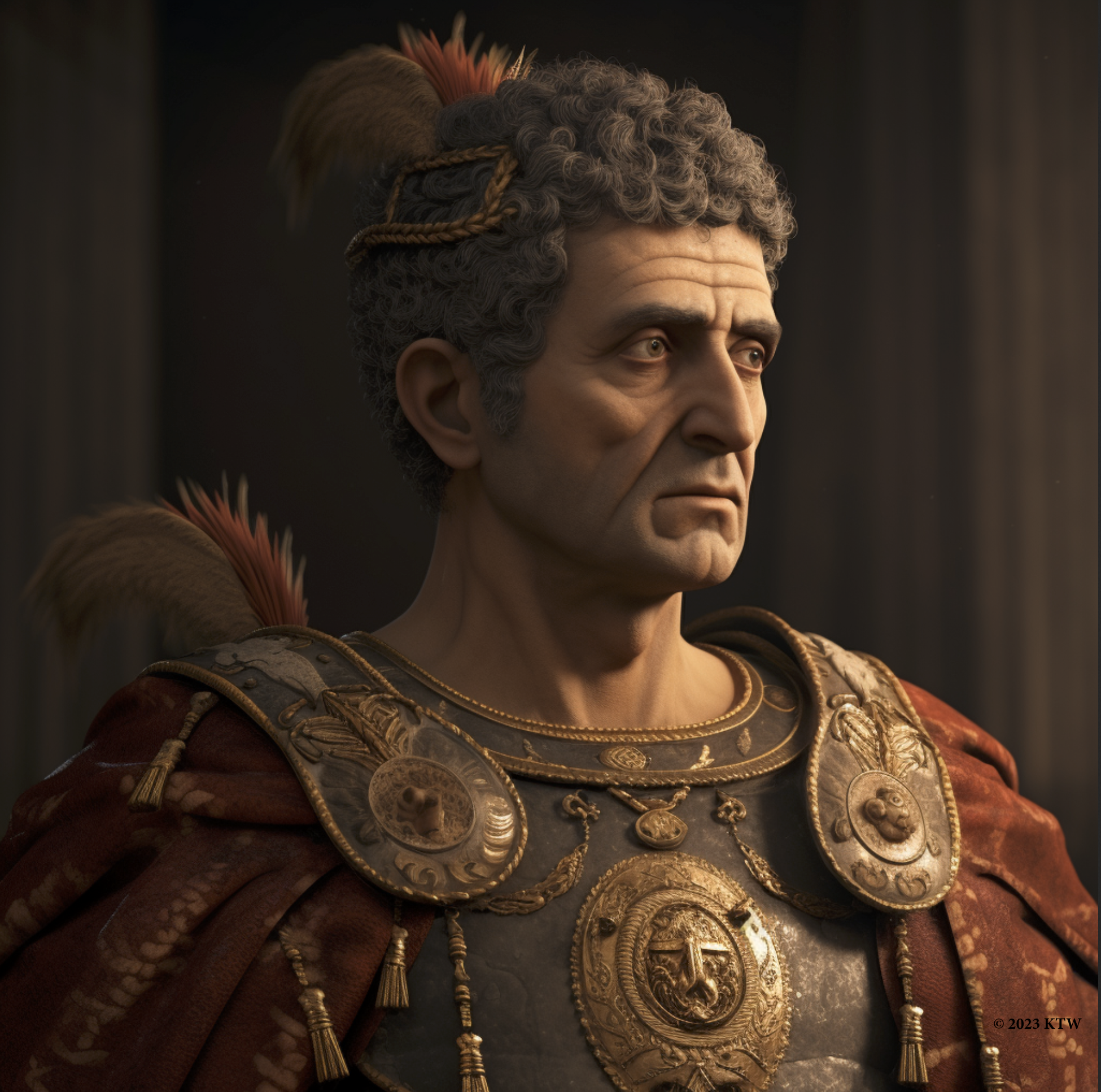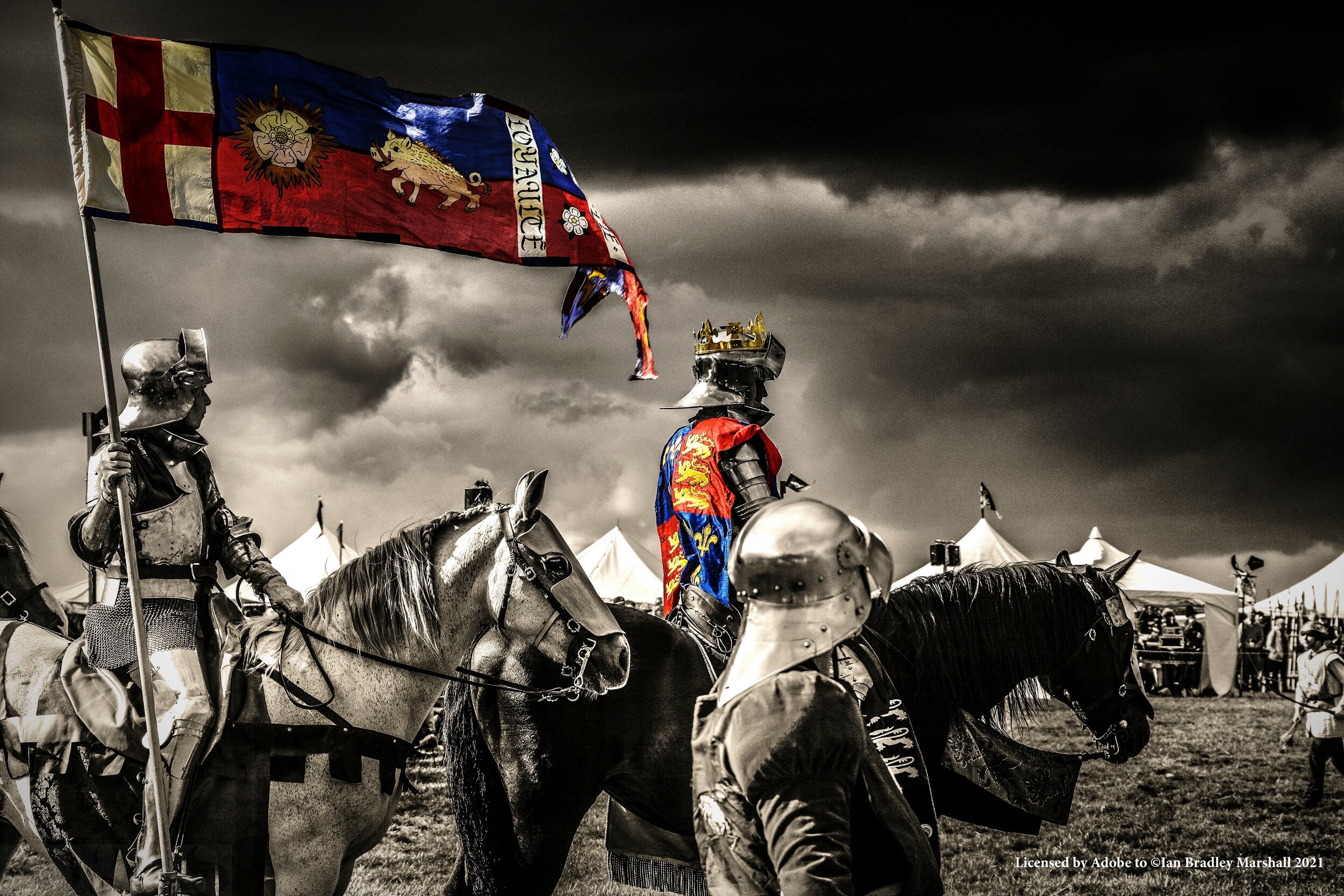CARACTACUS

EXTRACTS
Moments from History
CARACTACUS ~ His Speech to Emperor Claudius ~ an Example to us All, Even Today
Introduction
Whichever language we speak in any part of this wonderful planet, we are rightly proud of our language, and we know how our language develops, and millions of us delight in finding examples of our language as it was spoken by our ancestors, often reaching back a thousand years and more. It is the same when I look at names. Each name gives me its own history, and I find countless links between nations and empires existing three and four thousand years ago. Young parents will certainly know of this.
That is the only reason why this first plate is today’s version of a poem written around five hundred years ago. It is fascinating to see that the evolution of my mother language was even at work then as one sees how certain ancient letters are also written in ‘modern’ form within the same text, and of course, we know from where we sit, that by the time a century had passed, the change was complete and absolute. I smile at the American English term ‘gonna’ or ‘I’m gonna’ ~ ‘going’ or ‘I’m going to ’. When I read the subtitles but clearly hear the voice use formal language, then I accept that I’m looking at today’s equivalent of the gradual replacement and eventual discarding of the symbol ƒ (s) from the English alphabet.
The plate below also enabled me to call upon a skill that was once in daily use.
Legal documents, often two or three hundred years old, were written in a language that many secretaries understandably found challenging. In the 1980s we still employed highly skilled legal secretaries who could not only read an abstract of title but could type an abstract of title. Because I love to read, I naturally found my way around reading ancient legal documents. Another rivet is in place to doubly secure my tenure of employment! But what really made it doubly secure was when fellow lawyers would pop along the corridor in something of a flutter…
Ken, Ken, sorry to barge in, no, carry on drinking your coffee, don’t stand up, but I’ve got these clients coming in and the title I have to read to them is all gobbledegook. Could you be a darling and do a quick translation otherwise I’m for the chop! and many other similar situations.
Then came the word processor. Our secretaries were gradually dispensed with. Then came the worldwide web and the computer and overnight, legal practice changed. And with our secretaries also departed their priceless skills. It reminds me of the great shipyards in Scotland, world-famous in their day, yards that would exist forever. Or so we thought. With the loss of the shipyards has been lost the ability to design, build and engineer ships. As a maritime nation, this is serious, indeed very serious, when we realise that the world’s shipping industries are now firmly held within the grip of a superpower with whom we might find ourselves at war one day.
Language is vital. When a country and there are many, decides to try and destroy a language, then we know that we stare subjugation in the face.
Part I
Part II
In the revised edition of another Moment from History entitled Battle of Britain Day ~ 15 September 1940 - I mention how Churchill’s authorship of his History of the English-Speaking Peoples came to a very abrupt stop in 1939 due to his urgent return to government. And that he remarks upon this in his preface to the first edition of this great work in 1957.
My own observation was that I could see, clearly, the strength and intellectual understanding of our history upon which he drew, to make some of the finest and, at times, truly frightening speeches, in order to stir freedom and to dare to say a very belligerent ‘no’ to that man in Berlin.
I came across the passage below on pages 17-18 of Volume One. At school, I remember the name Caractacus because of a playground song we used to sing about him, as children.
But reading this passage sheds further light upon the momentous events of 1940 in the way Churchill’s mind was formulating. It is an account of great dignity and power, way, way beyond, and superior to, the drivel of a failed Austrian artist, and it is no wonder the man baulked at the last moment at the doors to the hotel in Munich where Churchill was in 1932.
I often wonder what would have happened had those two men met.
My own observation was that I could see, clearly, the strength and intellectual understanding of our history upon which he drew, to make some of the finest and, at times it must be recognised, truly frightening speeches, in order to stir freedom and to dare to say a very belligerent ‘no’ to Adolf Hitler.
I say that with conviction.
My parents were 12 and 13 in 1940 (think today Ukraine 2022-2023) and they were terrified. And then the bombs fell and small parts of Cheltenham suddenly disappeared. The bombs fell again on a very cold and damp November night, and by the morning the city centre of the Family’s home city of Coventry had gone. (Again, think today Ukraine 2023).
Today, the People of Ukraine have likewise replied with a very belligerent ‘no’ to Vladimir Putin.
“Слава Україні” ~ Glory to Ukraine
Ukraine Counter Offensive 29 August 2022 ~ Image is by courtesy of the BBC News 24
Part III
I came across this passage on pages 17-18 of Volume One.
At school, I remember the name Caractacus, but more likely because of a playground song we used to sing about him, as children do.
But reading this passage sheds further light upon the momentous events of 1940 in the way Churchill’s mind was formulating.
It is an account of great dignity and power, way, way beyond, and superior to, the drivel of a failed Austrian artist. It is no wonder the man baulked at the last moment at the doors to the hotel in Munich where Churchill was in 1932. An observer recalled how the man had gone there with confidence in his step. But as he placed his hands on the handles of the glass French doors and peered through to see Churchill very much a man who knew what he was about, the observer sensed fear. He quickly thought for a second or so, and then retraced his steps. This remains uncited at present. As soon as I find my marginal note, I will append the source as a footnote.
I often wonder what would have happened had those two men met.
Of the ‘fame of the British prince’, Churchill pens thus:
BUT THE British war continued. The Britons would not come to close quarters with the Romans, but took refuge in the swamps and the forests, hoping to wear out the invaders, so that, as in the days of Julius Caesar, they should sail back with nothing accomplished. Caractacus escaped to the Welsh border, and, rousing its tribes, maintained an indomitable resistance for more than six years.
“The fame of the British prince”, writes Suetonius, “had by this time spread over the provinces of Gaul and Italy; and upon his arrival in the Roman capital the people float from all quarters to behold him. The ceremonial of his entrance was conducted with great solemnity. On a plain adjoining the Roman camp the Pretorian troops were drawn up in martial array. The Emperor and his court took their station in front of the lines, and behind them was arranged the whole body of the people. The procession commenced with the different trophies which had been taken from the Britons during the progress of the war. Next followed the brothers of the vanquished prince, with his wife and daughter, in chains, expressing by their supplicating looks and gestures the fears with which they were actuated. But not so see himself. With a manly gait and an undaunted countenance, he marched up to the tribunal where the Emperor was seated, and addressed him in the following terms:
Part IV
It was not until A.D. 50 that Caractacus was finally defeated by a new general, Ostorius, the successor of Plautius, who reduced to submission the whole of the more settled regions from the area of what is known as The Wash on the east coastline to the Severn Estuary on the west coastline. It is, coincidentally, also the line drawn in Operation Sealion in 1940 which would have seen all parts of England below that line occupied by the Nazis, their springboard for their next phase. But that did not happen and so we wind back to the Second Century of the Common Era (or 2nd Century AD).
Caractacus, however, escaping from the ruin of his forces in the West, sought to raise the Brigantes in the North of England and which today we know as Yorkshire. At that time, Yorkshire was the largest tribe in the entire island of Britain. Caractacus had presumed that their queen, Cartimandua, the granddaughter of King Bellnorix, who had taken the throne around the time of the Roman invasion and conquest almost half a century earlier. Unfortunately, Queen Cartimandua promptly handed him over to the Romans. I imagine it is a case of survival instinct.
Human nature never changes. We are n better now than we were two, three, and four thousand years ago.
I remember, as a boy, reading the bible and reading the Ladybird book on British kings and queens down the ages and, therefore, I had an understandably blinkered approach.
I was born in 1953, three months before the coronation of Queen Elizabeth II, and I grew up not only with the newsreels but also the little boy’s wonder at a pile of ‘royal books’ that included the huge volume Sixty Years a Queen. Grandma and Grandad knew how they could keep me quiet. All those wonderful photographs and coloured drawings! And all of those horses. I need them for my cavalry regiments.
Thus, at school, reading about kings and cities in Palestine and Israel and Judea, and close to home, ours in these islands, I presumed all looked like the late Queen. The cities must all be like London or Gloucester.
In my fifties, I spent time in Israel. Oh, dear! It was as if my huge balloon promptly did a very graceful deflation and shrivelled up on the carpet.
Hang on. These are just petty warring tribes. These monarchs are just tribal chieftains. And the five cities of Sodom and Gomorrah ... well their impressive outline tells me that poor old Abraham was dealing with, perhaps, one large township and four villages scattered about. Close to home, good god, Yorkshire is just a county, that troublesome one even today! Haha.
Thus, one obtains a hint. So that’s why Kenney Wenney is always emphasizing the importance of getting things truly in perspective!
Part V
Let us return to the plight of Caractacus, and in doing so, we again follow Churchill’s History of the English Speaking Peoples.
In particular, we look at the situation as reported by the Roman historian Gaius Suetonius Tranquillus (circa AD 69 – AD 122) around 53-54 years of age when he died. Oxford Bibliographies suggest that Suetonius held a prominent position in Imperial Rome during the Second Century CE (AD). His scholarly works include biography, philology, and antiquarianism.
Churchill writes:
“The fame of the British prince”, writes Suetonius, “had by this time spread over the provinces of Gaul and Italy; and upon his arrival in the Roman capital the people float from all quarters to behold him. The ceremonial of his entrance was conducted with great solemnity. On a plain adjoining the Roman camp the Pretorian troops were drawn up in martial array. The Emperor and his court took their station in front of the lines, and behind them was arranged the whole body of the people. The procession commenced with the different trophies which had been taken from the Britons during the progress of the war. Next followed the brothers of the vanquished prince, with his wife and daughter, in chains, expressing by their supplicating looks and gestures the fears with which they were actuated. But not so see himself. With a manly gait and an undaunted countenance he marched up to the tribunal where the Emperor was seated, and addressed him in the following terms:
Emperor Claudius received the personal petition by the captive British prince Caractacus in Rome in silence.
“If to my high birth and distinguished rank I had added the virtues of moderation Rome had been held to me rather as a friend rather than a captive, and you would not have rejected an alliance with a prince descended from illustrious ancestors and governing many nations. The reverse of my fortune to you is glorious, and to me humiliating. I had arms, and men, and horses; I possessed extraordinary riches; and can it be any wonder that I was unwilling to lose them? Because Rome aspires to universal dominion must men therefore implicitly resign themselves to subjection? I have posed for a long time the progress of your arms, and had I acted otherwise would either you have had the glory of conquest or I of a brave resistance? I am now in your power. If you are determined to take revenge my fate will soon be forgotten, and you will derive no honour from the transaction. Preserve my life, and I shall remain to the latest ages a monument of your clemency.
Suetonius then records what must have been quite an unusual episode in Imperial Rome.
“Immediately upon this speech Claudius granted him his liberty, as he did likewise to the other Royal captives. They all returned their thanks in a manner the most grateful to the Emperor; and as soon as the chains were taken off, walking towards Agrippina, who sat upon the bench at a little distance, they repeated to her the same fervent declarations of gratitude and esteem.”
Suetonius Tranquillus, The Lives of the Twelve Caesars
Concluding Part VI
Sigebehrt is a member of the Guard of King Caractacus. His master and mistress were before the Emperor Claudius.
And the Roman court looked on in amazement. Whispered conversations.
Now and again, an odd phrase reached the Palace Guard.
But we were told they were savages…
… Who are these people?
Why do they look so like us and even speak our language with fluency?
One guard leaned inward to his friend. “We have conquered many islands, but Britannicus is like no island we have encountered. We would do well to rule with and not over these people.”
“But why so? They are just savages.”
“You have not seen what I have seen. And in aeons to come, my dream last night was nightmarish.”
“Why so? You have been drinking too much wine again. What was so nightmarish?”
“They ruled an empire so vast that our own empire was merely a province within its imperial realm.”
“Now I KNOW you’ve been drinking too much wine!”
20 June 2023
All Rights Reserved
Liverpool
© 2023 Kenneth Thomas Webb















Ken Webb is a writer and proofreader. His website, kennwebb.com, showcases his work as a writer, blogger and podcaster, resting on his successive careers as a police officer, progressing to a junior lawyer in succession and trusts as a Fellow of the Institute of Legal Executives, a retired officer with the Royal Air Force Volunteer Reserve, and latterly, for three years, the owner and editor of two lifestyle magazines in Liverpool.
He also just handed over a successful two year chairmanship in Gloucestershire with Cheltenham Regency Probus.
Pandemic aside, he spends his time equally between his city, Liverpool, and the county of his birth, Gloucestershire.
In this fast-paced present age, proof-reading is essential. And this skill also occasionally leads to copy-editing writers’ manuscripts for submission to publishers and also student and post graduate dissertations.









